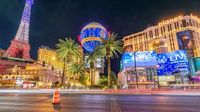Las Vegas, a city famed for its dazzling lights and round-the-clock entertainment, is now facing a reality check that few could have anticipated just a year ago. After a string of record-breaking years, the city’s tourism industry has hit a pronounced slump, with ripple effects already being felt across the Strip, downtown, and in the very coffers that bankroll some of the city’s grandest projects.
According to the Las Vegas Convention and Visitors Authority (LVCVA), only 3.1 million people visited Sin City in June 2025—a sharp 11.3% drop compared to June 2024. While the city has weathered downturns before, this latest decline has set off alarm bells, particularly for the public finances tied to Las Vegas’s ambitious sports and entertainment infrastructure.
Jeremy Aguero, a well-known Las Vegas consultant and principal at Applied Analysis, minced no words when speaking to LVSportsBiz.com: “A correction is coming.” He pointed to the monthly hotel room tax revenue—a crucial source of funds for paying off the region’s $1 billion-plus debt on the $750 million public contribution to the Las Vegas Raiders’ NFL stadium. In February 2025, hotel room tax revenue plummeted to $4.75 million, a staggering 27.7% decrease from the $6.58 million collected in February 2024. That’s a shortfall of $1,824,287 in just one month.
And it’s not an isolated blip. The Las Vegas Stadium Board’s charts show similar revenue dips in October and November 2024. With the Board set to meet on August 21, 2025, many are bracing for more sobering numbers covering March, April, and May. Aguero, who has long been a central figure in stadium subsidy debates and economic impact presentations, told LVSportsBiz.com that while he likes to spice up his talks with humor and movie clips, the underlying data is serious: “We’re analyzing the economy all the time.”
So what’s driving the downturn? Aguero outlined a cocktail of factors: persistent inflation, an aging traveler demographic, a drop in international visitors, and, perhaps most troubling, the sense that Las Vegas has priced out some of its core customer base. “Housing attainability keeps me up at night,” he admitted, referencing the broader economic stresses facing locals even as the city courts high-rolling tourists.
But not everyone is ready to sound the doomsday alarm. Derek Stevens, CEO of Circa Casino & Resort, offered a more nuanced take in an interview with Fox News Digital. “I think some of the data in Las Vegas indicates that some of these stories are a bit exaggerated,” Stevens said. While acknowledging the 11.3% drop in visitors, he pointed out that gaming revenues in June 2025 actually rose statewide by 3.5% compared to the previous year, hitting $1.33 billion according to the Nevada Gaming Control Board.
Stevens believes that the story of Las Vegas’s downturn is far from uniform. “If you really start unpeeling some layers of the onion in Las Vegas, I think you’re going to find companies that have very specific areas that are a little less subject to the economy and that are doing OK,” he explained. For example, sports-oriented properties and entertainment venues like the Sphere and musical concerts have continued to draw crowds. Circa itself has found a niche with events such as UFC fight weekends and fantasy football contests.
Still, Stevens didn’t sugarcoat the challenges. The city’s main airport, Harry Reid International, saw passenger traffic drop by 4.1% compared to last year. And the decline in international tourism is especially acute—U.S. Travel Association figures suggest a 10% reduction in Canadian travel to the United States, translating to about 2 million fewer visits. “We’re missing some of our Canadian friends who aren’t visiting this year,” Stevens said, attributing the shortfall to global economic uncertainty and unfavorable exchange rates.
Stevens also noted that while some properties are weathering the storm, others—especially those more reliant on international or budget travelers—are feeling the pinch. “I think that’s something you see in any heavily, heavily visited area, whether it’s San Francisco, Hawaii, Southern California, Las Vegas, Florida,” he said. The impact isn’t evenly distributed, and some sectors are faring better than others.
Despite the gloom, both Aguero and Stevens agree on one thing: this isn’t the end of Las Vegas. Aguero was quick to dismiss the idea of a “nuclear winter,” telling LVSportsBiz.com that while the visitor decline is real, it’s not a death knell for the city. Stevens, meanwhile, remains optimistic about the near future. “I think in six months, I would believe that Vegas tourism and our economy overall will be in a much better place,” he predicted, citing upcoming trade agreements and a packed calendar of sporting and entertainment events that could help turn the tide.
But the stakes are high. The city’s reliance on tourism and hospitality taxes to fund massive public projects—like the Raiders’ stadium—means that prolonged declines could force some tough conversations about future investments and the sustainability of Las Vegas’s growth model. Aguero, who played a central role in the stadium subsidy bills for both the Raiders and the A’s, has warned that “a correction is coming,” and the numbers seem to back him up.
At the recent Las Vegas Global Economic Alliance Perspective event, Aguero’s team presented more than 150 slides packed with data, videos, and even pop culture references to keep the mood light. But beneath the surface, the message was serious: Las Vegas is at a crossroads. The city must adapt, whether that means courting new demographics, rethinking pricing strategies, or doubling down on the unique experiences that have always set it apart.
With a new CEO, Danielle Casey, taking the helm at the Las Vegas Global Economic Alliance, there’s hope that fresh leadership could bring new ideas to the table. For now, the city’s power brokers and business owners are watching the numbers closely—and hoping that the next six months will bring the rebound that so many are banking on.
As the neon lights continue to flicker and the dice keep rolling, Las Vegas is betting on its own resilience. The coming months will reveal whether that gamble pays off—or if the house, for once, doesn’t win.


